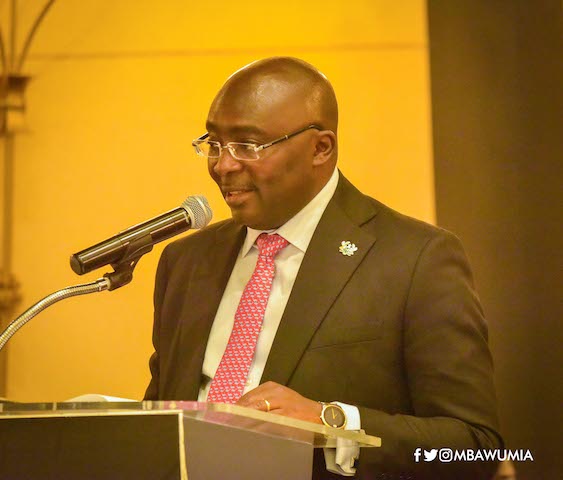Vice President Dr Mahamudu Bawumia on Wednesday waded into the debate about the use of drones to distribute blood and other essential medicines to hard-to-reach communities across the country, saying that the technology is a national priority that would save many lives.
The Vice President recounted a personal experience on September 22, 2002 at the Tamale Hospital where his father underwent a surgery and needed blood urgently to survive, but could not find blood immediately and died eventually.
“It haunted me and still haunts me and so if you have a technology that can help a dying mother or someone dying of snake bite brings the medicine, I think it’s something that is so important and we should grab and make use of.
“It is not a political issue because everybody who is dying will not ask whether you’re NDC or NPP,” Dr Bawumia stated.
Vice President Bawumia made the remarks when he addressed key stakeholders in the Mobile Telecom Industry at a breakfast meeting in Accra.
He advocated the need for the nation to embrace technology because it would improve upon the living standards of the people, saying if Rwanda is using drones for distribution of blood and other essential drugs and sees it as a priority then it’s also a priority to Ghana.
The event, held under the auspices of the Vice President and the Chamber of Telecommunications, was on the theme: “Leveraging Effective Use and Distribution of Spectrum in Ghana for National Development”.
The meeting brought together stakeholders including the National Communications Authority, Ministry of Communications, Ghana Revenue Authority, Ministry of Finance, members of the Parliamentary Select Committee on Communications and communication consultants, to take stock of the country’s spectrum policies and discuss the effective use and distribution of spectrum to help achieve the “Ghana Beyond Aid”.
According to the Ghana Health Service, the drones would be used for distribution of blood and essential drugs and medical products to hard-to-reach areas across the country.
Government communicators have stated that the drone delivery services will come at no cost to the government but rather corporate entities would bear the cost through their social responsibility obligations.
Ghana’s emergency medical drone delivery service is expected to save the nation millions of Ghana cedis by eliminating the need for expensive emergency trips to pick up medical products in far distance places.
The drones are expected to operate 24-hour per day from distribution centres across the country, which would be stocked with life-saving and essential medical supplies and help save lives of expectant mothers and women in labour, persons undergoing surgery, accident victims, among others.
Zipline, a California-based automated logistics company, is expected to build and operate the drone delivery services and would employ more than 200 Ghanaian pharmacists, engineers, flight operators, and many more essential and allied support staff.
Vice President Bawumia said: “As a country, we should really embrace technology because a lot of the time, we think technology is far-fetched contraption only for the advanced world countries, and sometimes we don’t give ourselves the opportunity to realise the existence of technology.
“We can do exactly or even more coming to the game than the first world countries are doing.
“This is because it allows us to leapfrog and solve real problems that affect ordinary people who are living in the rural areas who have no access to these services with technology,” the Vice President noted.
Touching on the country’s spectrum services, Dr Bawumia said the nation had accomplished a great deal over the past decade by using spectrum, noting that, mobile broad band had stimulated job creation, kept people’s information safe, deepened knowledge and promoted business.
He said the new array of advancements, which enabled service providers and consumers to take control of spectrum services in their homes, businesses, inner cities and remote areas were fast becoming part of everyday life.
Madam Mitwa Kaemba Na’Ambi, the Chief Executive Officer of the Airtel/Tigo, and Member of the Chamber of Telecommunications Governing Council, in an address, acknowledged the role of the Vice President in leading the digital transformation agenda in Ghana.
She mentioned the role the Vice President played in rolling out the Mobile Money Interoperability Payment System, which had given the nation international recognition and gave the assurance that the chamber would collaborate with the Government to implement innovative and transformative programmes in the future.
Madam Kaemba Na’Ambi said the Chamber would collaborate with government in implementing the spectrum and mobile licensing regime so that the players in the telecommunication industry would secure the required investment for effective and efficient service delivery.
There were presentations by international telecommunication consultants including Mr Stefan Zehle of the COLEAGO Consulting, and Mr Oliver Chapman, of the GSMA.
They made extensive presentations on Pricing and Assigning Spectrum in Developing Markets and Spectrum Policy and Licensing to Ensure Sustainable and Competitive Telecom Market in Ghana.
Source: GNA




